#city of Mount Vernon
Explore tagged Tumblr posts
Text

#MountVernon
#Peekskill
#Yonkers
#Regents
N.B. I looked at the data for these three districts because I have experienced them either 1. as a student or 2. as a parent of a child in that district.
ELA
Mount Vernon: 74% proficient
Peekskill: 56% proficient
Yonkers: 74% proficient
Algebra I
Mount Vernon: 27% proficient
Peekskill: 50% proficient
Yonkers: 53% proficient
Algebra II
Mount Vernon: 22% proficient
Peekskill: 45% proficient
Yonkers: 50% proficient
Geometry
Mount Vernon: 14% proficient
Peekskill: 14% proficient
Yonkers: 30% proficient
**********************************
https://www.syracuse.com/hslife/2023/01/see-ny-school-districts-ranked-from-1-to-more-than-500-based-on-latest-regents-exams.html?fbclid=IwAR35G1JHstHdCZwcLMJJKMH3zJD4plnOYPG2feKUEIQ13jrbvfVrscm7HmM
#Yonkers Public Schools#YPS#MVCSD#Mount Vernon City School District#Peekskill City School District#Yonkers#Yonkers NY#Mount Vernon New York#City of Mount Vernon#peekskill#peekskill ny#peekskill new york#peekskill n.y.#city of peekskill#hudson valley#hudson valley ny#city of peekskill new york#westchester#hudsonvalley#westchester county#peekskillny#hudson valley new york#cityofpeekskill#city of peekskill ny#PCSD
0 notes
Text

METRO-NORTH--8049 appr Mt. Vernon West IB
Inbound 10-car train of M3s. (The M7s can't run in trains longer than 8 cars.) 19.6.2013. © 2013 Peter Ehrlich
#commuter train#mncr#metro north commuter railroad#mta#metropolitan transportation authority#2013#new york city#trains#passenger train#history#mount vernon#new york
8 notes
·
View notes
Text

1am
12.16.24
Baltimore, MD
#baltimore#maryland#calvert street#fire#firefighters#house fire#fire rescue#ems#bcfd#baltimore city#mount vernon#midtown
2 notes
·
View notes
Text








Took a trip into Baltimore with my friend Ali and Vincent to see some art and have an adventure (not pictured the Bmore Licks ice cream I got was so delicious, it was vanilla apple pie)
#personal#personal post#momblr#mumblr#myphotos#maryland#baltimore#walters art museum#mount vernon#Baltimore city
4 notes
·
View notes
Text




MOUNT VERNON CITY FEST 🌟
IG: EYEOFTHELAMA 📸
#eyeofthelama#len lama#nyc#underground#rap#hip hop#mount vernon#city fest#cash cobain#bay swag#marridon#ao aliente#festival#show
0 notes
Video
Greek Dancers - Black and White by Kevin B. Moore Via Flickr: I also did a color version, which do you prefer?
0 notes
Text
Anyways, I think my livable cities formula is broken, no matter what I do with it or add to it, the top 25 cities stay the same, just in different orders.
It's always
St.Paul, Minneapolis
Albany, Alameda, San Francisco, Oakland, Emeryville, and Berkeley California
Portland Oregon
Denver and Boulder, CO
Arlington, VA
Washington DC
Seattle, WA
Newark, Paterson, Trenton, and Elizabeth NJ
Champaign-Urbana, Cicero, and Berwyn IL
Baltimore
Mount Vernon, NY
And Eureka CA
603 notes
·
View notes
Text
Last November, during a symposium at Mount Vernon on democracy, John Kelly, the retired Marine Corps general who served as Donald Trump’s second chief of staff, spoke about George Washington’s historic accomplishments—his leadership and victory in the Revolutionary War, his vision of what an American president should be. And then Kelly offered a simple, three-word summary of Washington’s most important contribution to the nation he liberated.
“He went home,” Kelly said.
The message was unambiguous. After leaving the White House, Kelly had described Trump as a “person that has no idea what America stands for and has no idea what America is all about.” At Mount Vernon, he was making a clear point: People who are mad for power are a mortal threat to democracy. They may hold different titles—even President—but at heart they are tyrants, and all tyrants share the same trait: They never voluntarily cede power.
The American revolutionaries feared a powerful executive; they had, after all, just survived a war with a king. Yet when the Founders gathered in 1787 to draft the Constitution, they approved a powerful presidential office, because of their faith in one man: Washington.
Washington’s life is a story of heroic actions, but also of temptations avoided, of things he would not do. As a military officer, Washington refused to take part in a plot to overthrow Congress. As a victorious general, he refused to remain in command after the war had ended. As president, he refused to hold on to an office that he did not believe belonged to him. His insistence on the rule of law and his willingness to return power to its rightful owners—the people of the United States—are among his most enduring gifts to the nation and to democratic civilization.
Forty-four men have succeeded Washington so far. Some became titans; others finished their terms without distinction; a few ended their service to the nation in ignominy. But each of them knew that the day would come when it would be their duty and honor to return the presidency to the people.
All but one, that is.
Donald Trump and his authoritarian political movement represent an existential threat to every ideal that Washington cherished and encouraged in his new nation. They are the incarnation of Washington’s misgivings about populism, partisanship, and the “spirit of revenge” that Washington lamented as the animating force of party politics. Washington feared that, amid constant political warfare, some citizens would come to “seek security and repose in the absolute power of an individual,” and that eventually a demagogue would exploit that sentiment.
Today, America stands at such a moment. A vengeful and emotionally unstable former president—a convicted felon, an insurrectionist, an admirer of foreign dictators, a racist and a misogynist—desires to return to office as an autocrat. Trump has left no doubt about his intentions; he practically shouts them every chance he gets. His deepest motives are to salve his ego, punish his enemies, and place himself above the law. Should he regain the Oval Office, he may well bring with him the experience and the means to complete the authoritarian project that he began in his first term.
Many Americans might think of George Washington as something like an avatar, too distant and majestic to be emulated. American culture has encouraged this distance by elevating him beyond earthly stature: A mural in the Capitol Rotunda depicts him literally as a deity in the clouds. In the capital city that bears Washington’s name, other presidents such as Abraham Lincoln and Thomas Jefferson are represented with human likenesses; Franklin D. Roosevelt even smiles at us from his wheelchair. Washington is represented by a towering, featureless obelisk. Such faceless abstractions make it easy to forget the difficult personal choices that he made, decisions that helped the United States avoid the many curses that have destroyed other democracies.
For decades, I taught Washington’s military campaigns and the lessons of his leadership to military officers when I was a professor at the U.S. Naval War College. And yet I, too, have always felt a distance from the man himself. In recent months, I revisited his life. I read his letters, consulted his biographers, and walked the halls at Mount Vernon. I found a man with weaknesses and shortcomings, but also a leader who possessed qualities that we once expected—and should again demand—from our presidents, especially as the United States confronts the choice between democracy and demagoguery.
The votes cast in November will be more consequential than those in any other American election in more than a century. As we judge the candidates, we should give thought to Washington’s example, and to three of Washington’s most important qualities and the traditions they represent: his refusal to use great power for his own ends, his extraordinary self-command, and, most of all, his understanding that national leaders in a democracy are only temporary stewards of a cause far greater than themselves.
I
A CITIZEN, NOT A CAESAR
Popular military leaders can become a menace to a democratic government if they have the loyalty of their soldiers, the love of the citizenry, and a government too weak to defend itself. Even before his victory in the Revolutionary War, Washington had all of these, and yet he chose to be a citizen rather than a Caesar.
It is difficult, in our modern era of ironic detachment and distrust, to grasp the intensity of the reverence that surrounded the General (as he would be called for the rest of his life) wherever he went. “Had he lived in the days of idolatry,” a Pennsylvania newspaper stated breathlessly during the war, Washington would have “been worshiped as a god.” He was more than a war hero. In 1780, when Washington passed through a town near Hartford, Connecticut, a French officer traveling with him recorded the scene:
We arrived there at night; the whole of the population had assembled from the suburbs, we were surrounded by a crowd of children carrying torches, reiterating the acclamations of the citizens; all were eager to approach the person of him whom they called their father, and pressed so closely around us that they hindered us from proceeding.
Washington was addressed—by Americans and visiting foreigners alike—as “Your Excellency” almost as often as he was by his rank. In Europe, a French admiral told him, he was celebrated as the “deliverer of America.” Alexander Hamilton, his aide-de-camp during the war, later described Washington as a man “to whom the world is offering incense.”
At the war’s outset, Washington had believed that defeat and death—whether on the battlefield or on a gibbet in London—were more likely than glory. He worried that his wife, Martha, might also face threats from British forces, and was so concerned about her reaction to his appointment as commander of the Continental Army that he waited days before writing to tell her about it. Patrick Henry described a chance encounter with Washington on the street in Philadelphia, shortly after the vote approving Washington’s command. Tears welled in the new general’s eyes. “Remember, Mr. Henry, what I now tell you,” Washington said. “From the day I enter upon the command of the American armies, I date my fall, and the ruin of my reputation.”
Instead, Washington’s reputation grew. Yet despite his surprising successes as a general and his rise as the symbol of American liberty, he never allowed the world’s incense to intoxicate him. Although he was a man of fierce ambition, his character was tempered by humility and bound up in his commitment to republican ideals: He led an American army only in the name of the American people and its elected representatives, and he never saw that army as his personal property. His soldiers were citizens, like him, and they were serving at his side in a common cause. “When we assumed the soldier,” he said to a group of New York representatives shortly before he took command, “we did not lay aside the citizen,” a sentiment that he repeated throughout the war.
In the 18th century, Washington’s deference to the people’s representatives and the rule of law would have seemed almost nonsensical to his European counterparts. Most military officers of the time served for life, after swearing allegiance to royal sovereigns whose authority was said to be ordained by God. Often drawn from the ranks of the nobility, they saw themselves as a superior caste and found little reason to assure civilians of their good intentions.
Washington, however, insisted that his men conduct themselves like soldiers who tomorrow would have to live with the people they were defending today. Despite continual supply shortages, he forbade his troops from plundering goods from the population—including from his Tory adversaries. Washington’s orders were prudent in the short term; his army needed both supplies and the goodwill of the people. But they also represented his careful investment in America’s future: Once the war was over, the new nation would depend on comity and grace among all citizens, regardless of what side they’d supported.
Most American presidents have had some sort of military experience. A few, like Washington, were genuine war heroes. All of them understood that military obedience to the rule of law and to responsible civilian authority is fundamental to the survival of democracy. Again, all of them but one.
During his term as president, Trump expected the military to be loyal—but only to him. He did not understand (or care) that members of the military swear an oath to the Constitution, and that they are servants of the nation, not of one man in one office. Trump viewed the military like a small child surveying a shelf of toy soldiers, referring to “my generals” and ordering up parades for his own enjoyment and to emphasize his personal control.
Trump was more than willing to turn the American military against its own people. In 2020, for instance, he wanted the military to attack protesters near the White House. “Beat the fuck out of them,” the president told the chairman of the Joint Chiefs of Staff, General Mark Milley. “Just shoot them.” Both Milley and Defense Secretary Mark Esper (a former military officer himself) talked their boss out of opening fire on American citizens.
Senior officers during Trump’s term chose loyalty to the Constitution over loyalty to Donald Trump and remained true to Washington’s legacy. Such principles baffle Trump—all principles seem to baffle Trump, and he especially does not understand patriotism or self-sacrifice. He is, after all, the commander in chief who stood in Arlington National Cemetery, looked around at the honored dead in one of the country’s most sacred places, and said: “I don’t get it. What was in it for them?”
A year ago, Trump suggested that Milley should be executed for actions he’d taken in uniform, including reassuring China of America’s political stability both before and after January 6, 2021. Esper has said that he thinks he and Milley, along with other senior defense officials and military officers, could be arrested and imprisoned if Trump returns to office. In a second term, Trump would appoint senior military leaders willing to subvert the military and the Constitution to serve his impulses. He already tried, in his first term, to bring such people to the White House, naming Lieutenant General Michael Flynn, for example, as his national security adviser. Flynn was fired after only 23 days for misleading White House officials about lying to the FBI and now travels the country promoting outlandish conspiracy theories. Trump has praised Flynn and promised to bring him back in a second term.
Trump is desperate to reclaim power, and he is making threats about what could happen if the American people refuse to give it to him. Washington, even before he became president, was offered an almost certain chance to take ultimate power, and he refused.
In 1783, Washington was camped with most of the Continental Army in Newburgh, New York. Congress, as usual, was behind on its financial obligations to American soldiers, and rumbles were spreading that it was time to take matters into military hands. Some men talked of deserting and leaving the nation defenseless. Others wanted to head to Philadelphia, disband Congress, and install Washington as something like a constitutional monarch.
Washington allowed the soldiers to meet so they could discuss their grievances. Then he unexpectedly showed up at the gathering and unloaded on his men. Calling the meeting itself “subversive of all order and discipline,” he reminded them of the years of loyalty and personal commitment to them. He blasted the dark motives of a letter circulating among the troops, written by an anonymous soldier, that suggested that the army should refuse to disarm if Congress failed to meet their needs. “Can he be,” Washington asked, “a friend to the army? Can he be a friend to this country?”
Then, in a moment of calculated theater meant to emphasize the toll that eight years of war had taken on him, he reached into his pocket for a pair of eyeglasses, ostensibly to read a communication from a member of Congress. “Gentlemen,” he said, “you must pardon me, for I have not only grown gray but almost blind in the service of my country.” Some of the men, already chastened by Washington’s reproaches, broke into tears. The Newburgh conspiracy, from that moment, was dead.
The presidential historian Stephen Knott told me that Washington could have walked into that same meeting and, with a nod of his head, gained a throne. “A lesser man might have been tempted to lead the army to Philadelphia and pave the way for despotism,” Knott said. Instead, Washington crushed the idea and shamed the conspirators.
Nine months later, Washington stood in the Maryland statehouse, where Congress was temporarily meeting, and returned control of the army to the elected representatives of the United States of America. He asked to be granted “the indulgence of retiring from the service of my country” and handed over the document containing his military commission. Washington, in the words of the historian Joseph Ellis, had completed “the greatest exit in American history.”
Decades ago, the scholar S. E. Finer asked a question that shadows every civilian government: “Instead of asking why the military engage in politics, we ought surely ask why they ever do otherwise.” The answer, at least in the United States, lies in the traditions instituted by Washington. Because of his choices during and after the Revolution, the United States has had the luxury of regarding military interference in its politics as almost unthinkable. If Trump returns to office with even a handful of praetorians around him, Americans may realize only too late what a rare privilege they have enjoyed.
II
A MAN IN COMMAND OF HIMSELF
Washington’s steadfast refusal to grasp for power was rooted not only in his civic beliefs, but also in a strength of character that Americans should demand in any president.
When he returned to Mount Vernon after the war, Washington thought he was returning permanently to the life of a Virginia planter. His mansion is small by modern standards, and his rooms have a kind of placidity to them, a sense of home. If you visited without knowing who once lived there, you could believe that you were wandering the property of any moderately successful older gentleman of the colonial era, at least until you noticed little details, such as the key to the Bastille—a gift from Washington’s friend the Marquis de Lafayette—hanging in the hall.
The estate is lovingly cared for today, but in 1783, after nearly a decade of Washington’s absence, it was a mess, physically and financially. Its fields and structures were in disrepair. Washington, who had refused a salary for his military service, faced significant debts. (When Lafayette invited him in 1784 to visit France and bask in its adulation, Washington declined because he couldn’t afford the trip.)
But Washington’s stretched finances did not matter much to the people who showed up regularly at his door to seek a moment with the great man—and a night or two at his home. Customs of the time demanded that proper visitors, usually those with an introduction from someone known to the householder, were to be entertained and fed. Washington observed these courtesies as a matter of social duty, even when callers lacked the traditional referral. More than a year would pass after his return to Mount Vernon before he and Martha finally enjoyed a dinner alone.
Like many of the other Founders, Washington embraced the virtues of the ancient Stoic thinkers, including self-control, careful introspection, equanimity, and dispassionate judgment. He tried to overcome petty emotions, and to view life’s difficulties and triumphs as merely temporary conditions.
In the words of his vice president, John Adams, Washington had “great self-command”—the essential quality that distinguished him even among the giants of the Revolution and made him a model for future generations of American political and military leaders. Like anyone else, of course, he was beset by ordinary human failings. As his letters and the accounts of friends and family reveal, he was at times seized by vanity, anxiety, and private grievances. He was moody. His occasional bursts of temper could be fearsome. He never forgot, and rarely forgave, personal attacks.
But Washington was “keenly aware” of his own shortcomings, Lindsay Chervinsky, the director of the George Washington Presidential Library at Mount Vernon, told me, and this self-knowledge, bolstered by his sense of personal honor, governed nearly all of Washington’s actions. He rarely allowed his pride to congeal into arrogance, nor his insecurities to curdle into self-pity. He refused to carry on public feuds—or to tilt the power he held against those who had slighted him.
Washington’s embrace of Stoicism helped him to step outside himself and confront the snares of his own ego and appetites, and especially to resist many of the temptations of power. His favorite play, Cato, was about Cato the Younger, a noted Stoic thinker and Roman senator who opposed the rise of Julius Caesar. Washington studied the examples of the great Roman republicans, particularly the story of Lucius Quinctius Cincinnatus, the Roman military leader who saved his nation on the battlefield and then returned to his farm. (Washington would later serve as the first president of the Society of the Cincinnati, an organization of Revolutionary War veterans.) As the president and CEO of Mount Vernon, Douglas Bradburn, told me during a visit to the estate, Washington genuinely regarded the Roman general as an example to be followed.
The Stoic insistence on merciless honesty, both with oneself and with others, is what allowed Washington to act with vigor but without venom, to make decisions without drama—another of the many grim differences between the character of the first president and that of the 45th. The Washington biographer Ron Chernow writes that “there was cunning in Washington’s nature but no low scheming. He never reneged on promises and was seldom duplicitous or underhanded. He respected the public” and “did not provoke people needlessly.” He desired recognition of his service, but hated boasting.
Americans have long prized these qualities in their best presidents. Trump has none of them.
Washington’s personal code had one severe omission. I had to take only a short walk from the mansion at Mount Vernon to see the reconstructed living quarters of some of the 300 enslaved people who worked his fields. Like other southern Founders, Washington did not let his commitment to freedom interfere with his ownership of other human beings. His views on slavery changed over time, especially after he commanded Black troops in battle, and he arranged in his will to free his slaves. But to the end of his life, Washington mostly left his thoughts on the institution out of public debates: His goal was to build a republic, not to destroy slavery. He did not right all the wrongs around him, nor all of his own.
But Washington did set the standard of patriotic character for his successors. Some failed this test, and long before Trump’s arrival, other presidents endured harsh criticism for their belligerence and imperious ego. Andrew Jackson, for example, was a coarse and rabid partisan who infuriated his opponents; the New York jurist James Kent in 1834 excoriated him as “a detestable, ignorant, reckless, vain and malignant tyrant,” the product of a foolish experiment in “American elective monarchy.”
Many presidents, however, have emulated Washington in various ways. We rightly venerate the wartime leadership of men such as Lincoln and FDR, but others also undertook great burdens and made hard decisions selflessly and without complaint.
When a 1980 mission to liberate American hostages held in Iran ended in flames and the death of eight Americans in the desert, President Jimmy Carter addressed the nation. “It was my decision,” he said, both to attempt a rescue and to cancel the operation when it became impossible to continue. “The responsibility is fully my own.” Almost 20 years earlier, John F. Kennedy had taken the heat for the disastrous effort to land an anti-Communist invasion at Cuba’s Bay of Pigs, when he could have shifted blame to his predecessor, Dwight Eisenhower, from whom he’d inherited the plan. The day after JFK was assassinated, Lyndon B. Johnson began his tenure as president not by affirming his new power, but by convening Kennedy’s Cabinet and affirming instead the slain president’s greatness. He asked them all to stay on. “I rely on you,” he said. “I need you.”
Gerald Ford ended up in the Oval Office due to the failures of Richard Nixon, unelected and with no popular mandate to govern. And yet, at a time of great political and economic stress, he led the nation steadily and honorably. He pardoned Nixon because he thought it was in the nation’s best interest to end America’s “long national nightmare,” despite knowing that he would likely pay a decisive price at the polls.
President Joe Biden displayed a common sentiment with these leaders when he declined to run for reelection in July. Biden, reportedly hurt that he was being pushed to step aside, nonetheless put defeating Trump above his own feelings and refused to exhibit any bitterness. “I revere this office,” he told the nation, “but I love my country more.”
None of these men was perfect. But they followed Washington’s example by embracing their duty and accepting consequences for their decisions. (Even Nixon chose to resign rather than mobilize his base against his impeachment, a decision that now seems noble compared with Trump’s entirely remorseless reaction to his two impeachments, his inability to accept his 2020 loss, and his warnings of chaos should he lose again.) They refused to present themselves as victims of circumstance. They reassured Americans that someone was in charge and willing to take responsibility.
Trump is unlike all of the men who came before him. Among his many other ignoble acts, he will be remembered for uttering a sentence, as thousands of Americans fell sick and died during a pandemic, that would have disgusted Washington and that no other American president has ever said, nor should ever say again: “I don’t take responsibility at all.”
III
A PRESIDENT, NOT A KING
One of the defining characteristics of Washington’s approach to the presidency was that he was always trying to leave it. He had been drawn back into public life reluctantly, attending and presiding over the 1787 Constitutional Convention only after a violent tax revolt in Massachusetts, known as Shays’s Rebellion, convinced him that the republic was still fragile and in need of a more capable system of government. Washington returned to Mount Vernon after the meeting in Philadelphia, but he already knew from discussions at the convention that he would be asked to stand for election to the new presidency as America’s only truly unifying figure. His 1789 victory in the Electoral College was unanimous.
Washington had no intention of remaining president for the rest of his life, even if some of his contemporaries had other ideas. “You are now a king under a different name,” Washington’s aide James McHenry happily wrote to him after that first election, but Washington was determined to serve one term at most and then go back to Mount Vernon. In the end, he would be persuaded to remain for a second term by Hamilton, Jefferson, and others who said that the new nation needed more time to solidify under his aegis. (“North and south,” Jefferson told him, “will hang together if they have you to hang on.”)
As he assumed the presidency, Washington was concerned that even a whiff of kingly presumption could sink America’s new institutions. Lindsay Chervinsky told me that Washington doubted the judgment and prudence of Vice President Adams not only because the vocal and temperamental Bostonian generally irritated him—Adams irritated many of his colleagues—but also because he had proposed bloated and pretentious titles for the chief executive, such as “His Highness, the President of the United States of America, and Protector of their Liberties.” Washington preferred the simpler title adopted by the House of Representatives: “President of the United States.”
The American people trusted Washington, but they didn’t trust an embryonic government created in a matter of months by a small group of men in Philadelphia. (When Washington took office, Rhode Island and North Carolina hadn’t even ratified the Constitution yet.) The first president sought to allay these suspicions by almost immediately undertaking a kind of reassurance tour, traveling throughout the states—the Virginian shrewdly chose to start in New England—to show Americans that the Constitution and the nation’s commander in chief were not threats to their liberties.
Donald Trump also traveled America once he was elected. After one of the most divisive presidential contests in modern American history, Trump embarked on a kind of victory tour through the states that had voted for him, and only those states. His campaign called it a “thank you” tour, but Trump’s speeches—praising his supporters, bashing his enemies—left no doubt about his intentions. “We are really the people who love this country,” he told a crowd in Mobile, Alabama. He was assuring his followers that although he now had to govern the entire nation, he was their president, an insidious theme that would lead directly to the tragic events of January 6.
In his first years in office, Washington could have shaped the new presidency to his liking. His fellow Founders left much in Article II of the Constitution vague; they disagreed among themselves about the powers that the executive branch should hold, and they were willing to let Washington fill in at least some of the blanks regarding the scope of presidential authority. This choice has bedeviled American governance, allowing successive chief executives to widen their own powers, especially in foreign policy. Recently, the Supreme Court further loosened the constraints of the office, holding in Trump v. United States that presidents have immunity for anything that could be construed as an “official act.” This decision, publicly celebrated by Trump, opens frightening opportunities for presidents to rule corruptly and with impunity.
Washington fought for the office rather than its occupant. Sharply cognizant that his every action could constitute a precedent, he tried through his conduct to imbue the presidency with the strength of his own character. He took pains not to favor his relatives and friends as he made political appointments, and he shunned gifts, fearing that they might be seen as bribes. He mostly succeeded: Those who came after him were constrained by his example, even if at times unwillingly, at least until the election of 2016.
Washington believed that the American people had the right to change their Constitution, but he had absolutely no tolerance for insurrectionists who would violently defy its authority. During his first term, Congress passed a new tax on distilled spirits, a law that sparked revolts among farmers in western Pennsylvania. What began as sporadic clashes grew into a more cohesive armed challenge to the authority of the United States government—the largest, as Ron Chernow noted, until the Civil War. In September 1794, Washington issued an official proclamation that this “Whiskey Rebellion” was an act of “treasonable opposition.” The issue, he declared, was “whether a small portion of the United States shall dictate to the whole Union.” He warned other Americans “not to abet, aid, or comfort the insurgents.”
In a show of force, Washington took personal command of a militia of more than 12,000 men and began a march to Carlisle, Pennsylvania—the only time a sitting president has ever led troops in the field. He had no wish to shed American blood, but he was ready to fight, and the rebellion dissipated quickly in the face of this military response. Later, in the first use of the pardon power, Washington spared two of the insurgents from the death penalty, but only after the legal system had run its course and they had been convicted of treason.
As the president’s second term neared its end, his advisers again implored him to remain in office, and again argued that the republic might not survive without him. Washington, his health fading and his disillusionment with politics growing, held firm this time. He was going back to Virginia. As with his retirement from military life, his voluntary relinquishment of power as head of state was an almost inconceivable act at the time.
In his farewell to the American people, the retiring president acknowledged that he had likely made errors in office, but hoped that his faults would “be consigned to oblivion, as myself must soon be to the mansions of rest.” In March 1797, the man who had sacrificed so much for his country that he had to borrow money to get to his first inauguration left Philadelphia as a private citizen. Less than three years later, he was dead.
IV
WASHINGTON BETRAYED
In a 2020 book about the first president, the historian Peter Henriques wrote that Washington “proved that his truest allegiance was to the republic by voluntarily surrendering power. It was the first of many peaceful transfers of power in the unprecedented American experiment.” Less than a year after the book’s publication, however, Trump would subvert this centuries-long tradition by summoning a mob against the elected representatives of the United States, after refusing to accept the result of the vote.
Trump stood by as insurrectionists swarmed the House offices and even the Senate chamber itself on January 6, in an attempt to stop the certification of the election by Congress. Hours later, after one of the worst single days of casualties for law-enforcement officers since 9/11, Trump finally asked his supporters to go home. “I know your pain,” he said, his words only emphasizing the delusional beliefs of the rioters. “I know you’re hurt. We had an election that was stolen from us.” He has since referred to the people convicted in American courts for their actions on January 6 as “patriots” and to those held in prison as “hostages.” He has promised to pardon them.
From the January/February 2022 issue: Trump’s next coup has already begun
Washington’s character and record ensured that almost any of his successors would seem smaller by comparison. But the difference between Washington and Trump is so immense as to be unmeasurable. No president in history, not even the worst moral weaklings among them, is further from Washington than Trump.
Washington prized patience and had, as Adams put it, “the gift of silence”; Trump is ruled by his impulses and afflicted with verbal incontinence. Washington was uncomplaining; Trump whines incessantly. Washington was financially and morally incorruptible; Trump is a grifter and a crude libertine who still owes money to a woman he was found liable for sexually assaulting. Washington was a general of preternatural bravery who grieved the sacrifices of his men; Trump thinks that fallen soldiers are “losers” and “suckers.”
Washington personally took up arms to stop a rebellion against the United States; Trump encouraged one.
Some Americans seem unable to accept how much peril they face should Trump return, perhaps because many of them have never lived in an autocracy. They may yet get their chance: The former president is campaigning on an authoritarian platform. He has claimed that “massive” electoral fraud—defined as the vote in any election he loses—“allows for the termination of all rules, regulations, and articles, even those found in the Constitution.” He refers to other American citizens as “vermin” and “human scum,” and to journalists as “enemies of the people.” He has described freedom of the press as “frankly disgusting.” He routinely attacks the American legal system, especially when it tries to hold him accountable for his actions. He has said that he will govern as a dictator—but only for a day.
Trump is the man the Founders feared might arise from a mire of populism and ignorance, a selfish demagogue who would stop at nothing to gain and keep power. Washington foresaw the threat to American democracy from someone like Trump: In his farewell address, he worried that “sooner or later the chief of some prevailing faction” would manipulate the public’s emotions and their partisan loyalties “to the purposes of his own elevation, on the ruins of public liberty.”
Many Americans in 2016 ignored this warning, and Trump engaged in the greatest betrayal of Washington’s legacy in American history. If given the opportunity, he would betray that legacy again—and the damage to the republic may this time be irreparable.
44 notes
·
View notes
Text

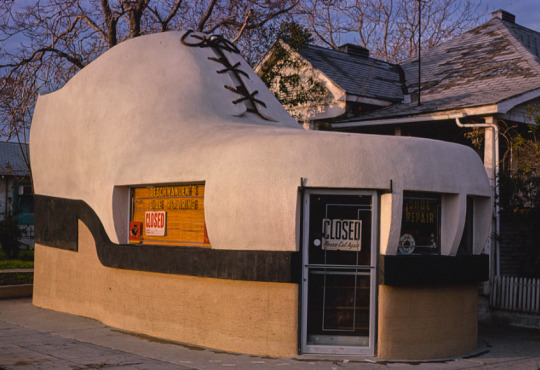
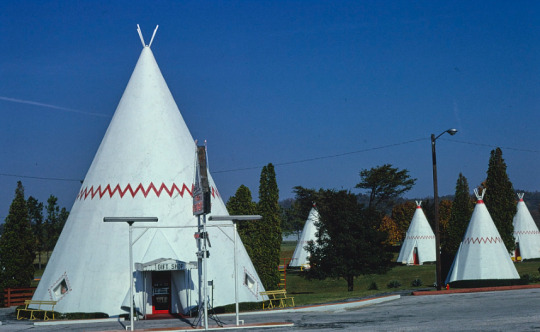

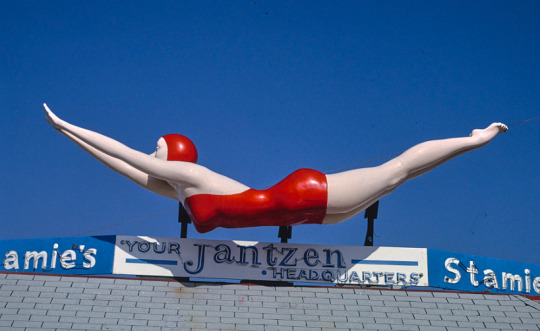
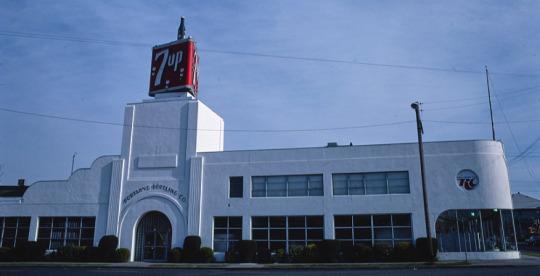
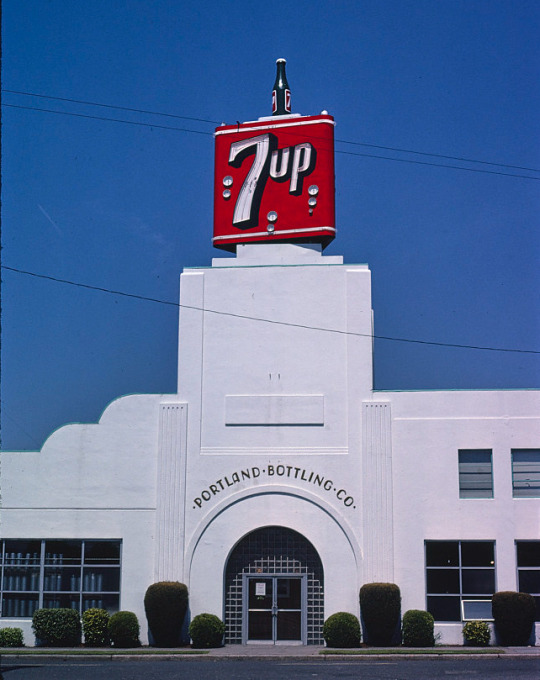


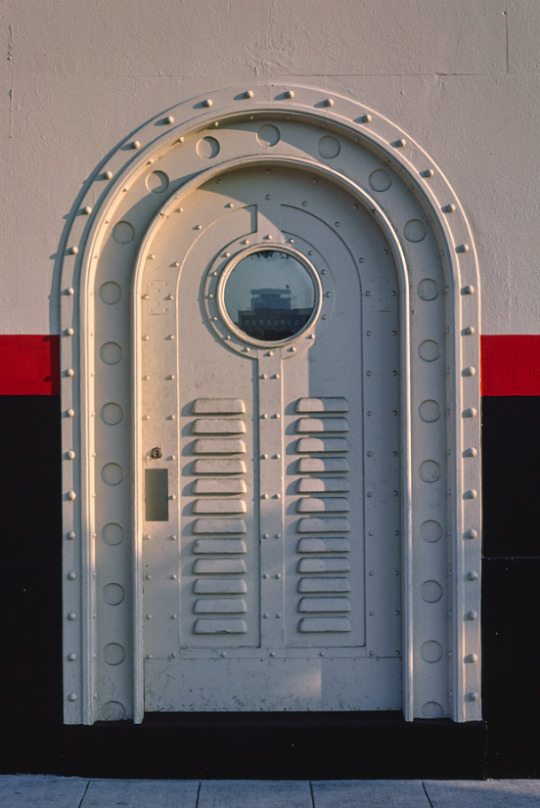
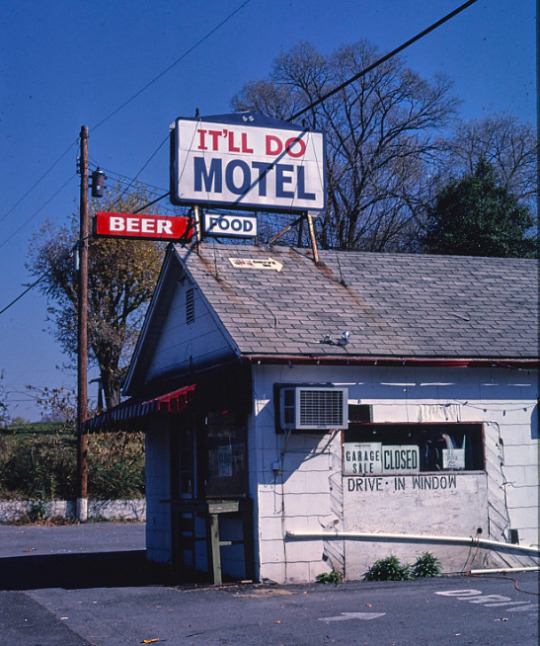

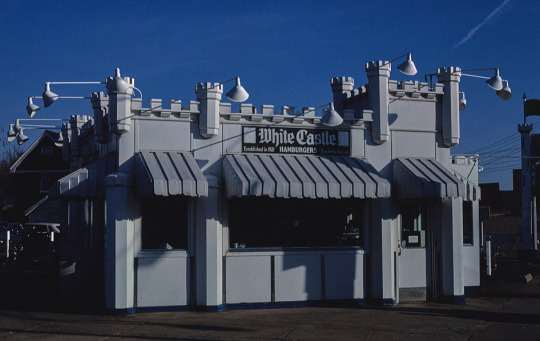

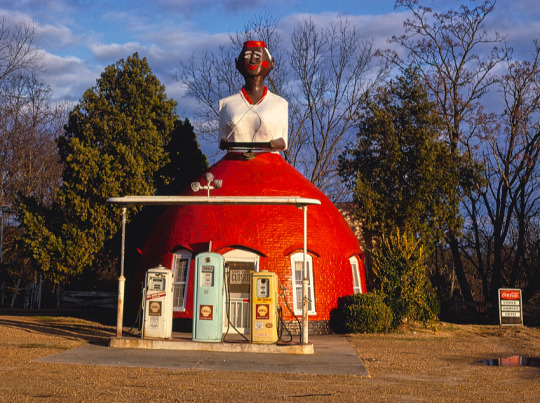
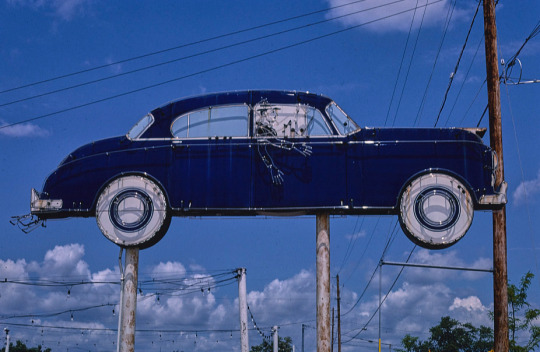


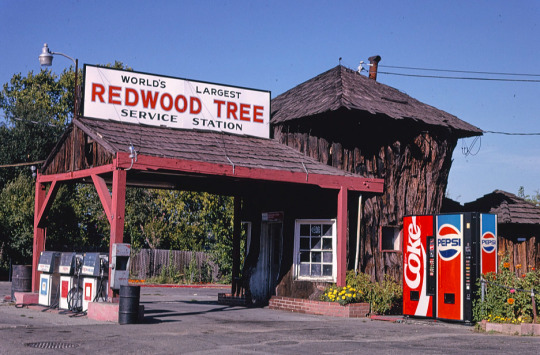



John Margolies (American, 1940-2016)
John Samuel Margolies was an architectural critic, photographer, and author who was noted for celebrating vernacular and novelty architecture in the United States, particularly those designed as roadside attractions. For almost forty years, he documented the most remarkable examples he found, publishing some of his discoveries in books and consigning the rest to an archive, which has now been purchased by the Library of Congress who, in a wonderfully gracious move, have lifted all copyright restrictions on the photographs. (see link below)
Gatorland Zoo alligator statue - Route 1, St. Augustine, Florida - 1979
Deschwanden's Shoe Repair (The Big Shoe) - 10th & Chester, Bakersfield, California - 1977
Wigwam Village #2 - office teepee and several teepee cabins - Route 31W, Cave City, Kentucky - 1979
Wigwam Village #6 - Route 66, Holbrook, Arizona - 1979
Jantzen sign - Stamie's Beachwear - Ocean Avenue, Daytona Beach, Florida - 1990
7-Up Bottling Company (two views) - NE 14 & Sandy Boulevard, Portland, Oregon - 1980
Coca Cola Bottling Company (two views) - 14th & Central Avenue, Los Angeles, California - 1977
Coca Cola Bottling Company (detail view of door) - 14th & Central Avenue, Los Angeles, California - 1977
It'll Do Motel (office) - Jonesborough, Tennessee - 1987
Joy Theater marquee - San Antonio, Texas - 1982
White Castle - Reading Road, Cincinnati, Ohio - 1980
Mammy's Cupboard (two views) - Route 61, Natchez, Mississippi - 1979
Dependable Used Cars sign - Division Street, Grand Rapids, Michigan - 1982
Stan The Tire Man statue - Broadway, Mount Vernon, Illinois - 1988
Bomber gas station - Route 99 E., Milwaukie, Oregon - 1980
World's Largest Redwood Tree Service Station (1936) - Route 101, Ukiah, California - 1991
Peach water tower - Frontage Road, Gaffney, South Carolina - 1988
Christie's Restaurant sign (cowboy shrimp) - Houston, Texas - 1983
Roadside flamingo statue - Frog City, Route 41, Florida - 1980
www.publicdomainreview.org/collection/john-margolies-photographs-of-roadside-america/
addendum: seen (not photographed) in a 2007 trip to Garibaldi/Nehalem/Manzanita Oregon — The Wheeler Inn with a wheelbarrow on the roof with a clothed female mannequin loaded into it . . .
30 notes
·
View notes
Text
Hate It Or Love It
Felix Catton x Reader

Everything was set up for you, new citizenship, new drivers license, and soon enough a new surname, all of it was ready for you to accept, but you weren’t being quick enough to do it, and your fiancé was becoming impatient.
For the past four years you had enjoyed your uni journey, your mother was nervous about you moving overseas, especially for that long. Your father had made you promise to keep in touch often and update them on your studies and to not let yourself forget about where you came from, he knew that Oxford would have a lot of wealthy students, some of who will be bratty and entitled, and though your family was far from being below the poverty line, your dad being a dentist and your mom an art teacher, your parents income combined still didn’t compare to the ones of most of your schoolmates.
Felix made it known from the very beginning that you were someone that was worth being on his radar, you were different than what he would usually be putting effort into, you were American for one, hailing from Yonkers, New York to be specific. He was confused on how nonchalant you were about the world around you, not being gaga about the fancy school and the students that came with it, how even though you weren’t here on a scholarship, your family was still able to afford for you to attend, they invested in your education from the day you were born and you never had to want for anything. As the years went on so did your relationship with Felix and his friend Oliver, the two were thick as thieves and fiercely loyal to their friendship, as wonderful as that was, you wished you would’ve known that it would also be the cause of your despair.
Your beauty was obvious, your personality was immaculate, it was just as easy to make friends and associates in the UK like you always did in the States, and with that came strong jealousy from Felix, the more you made connections the more he felt like you were forgetting about him, it was something he expressed to Ollie many times. And though he was successful at bringing your attention back to him, this time it was different. During your junior year you had met a fellow American student named Deacon Whittaker, he was also from New York, born and raised in Mount Vernon, the city was close to Yonkers and it made you both excited that even when you graduate and move back to America that you wouldn’t be that far away from one another, your home cities less than twenty minutes apart from one another.
Deacon was handsome, charming and very intelligent, the both of you looked to be the movie star looking power couple if you were his girlfriend instead of Felix’s . Your friendship started slow, you liked the idea of taking time to get to know each other and you managed to make it easy, so easy that you forgotten the ones you met when you moved here existed half of the time. You felt some guilt that you missed some calls, cancelled some planned meet ups and only stayed at Saltburn half of that summer, spending the other half in New York with yours and Deacon’s family, it hurt to see you pack your things and leave him, Felix had a lot of plans thought out and Deacon just had to go and ruin them, it was happening one, two, three too many times for his liking, he had you first, hell even Ollie, Venetia and Farleigh didn’t enjoy you forgetting about them, it would all have to end sooner or later.
By the time your senior year finally rolled around he had finally broke, he could no longer keep up the fake smiles and forced handshakes with Deacon, you were his girl, his one true love, the one person he’d give up everything for if it made you happy, now was the perfect time.
You and Deacon were coming back from your weekend in Edinburgh, you spent it there with some mutual friends from Oxford and now you’re ready to settle back into your dorms, but before you could his car unexpectedly got pulled over, after being asked for his license, Deacon asked what was the reason for the stop, he was sure he was following the traffic laws and knew he did anything else wrong, that was when the cop told him to step out of the car, he asked again in confusion what the issue was, that only pissed the officer off and made him open his door his door and practically drag him out.
“Hey! What is the problem? I didn’t do anything!”
“SHUT UP”
That’s when you got out of the car, you haven’t been this afraid in a good while
“Officer please what is the issue? He was being compliant!”
He ignored you and put him in the back of the police vehicle, all of your questions fell on deaf ears to him, he spoke to you as if you were some sort of victim, you didn’t understand where all of this was coming from.
After what felt like ages, a familiar vehicle pulled up beside the both of you, and when the windows were rolled down you saw not one but two people who you couldn’t understand would even be here.
“Felix?….Ollie? What’s going on?”
“Officer Jennings, thank you for your help”
“No problem Mr. Catton”
You rushed over to him “Felix! Please talk to him, he has Deacon in the back of his car in cuffs like a violent criminal, he didn’t do anything and he won’t tell me why he arrested him!”
He let out a heavy exhale and stepped out of the car along with Ollie following behind, he had a woeful expression and reached out to try to bring you into his car but you jerked away.
“Felix, what is going on? Let go of me!”
“What’s going on is that Deacon nicked some very valuable items from Saltburn, over a million pounds worth” Ollie said
“W-what? No no no he didn’t it’s no way”
Officer Jennings walked up behind you “It’s true Ms. YLN, we have strong evidence that while Mr. Whittaker visited Saltburn with you two months ago, he stole some valuable antiquities and heirlooms and attempted to sell them at some auction houses”
You looked back towards Felix “Please Felix, you know that isn’t true, he wouldn’t do this”
“He would if my family says he did”
“W-what?”
It was Ollie’s turn to elaborate some more.
“Come on YN you’re smarter than this”
“Felix, you can’t do this, you know this isn’t right!”
“It’s your choice YN, you know that Felix will always give you some say in your life…what’s it going to be? You end your friendship with Deacon cutting absolutely all ties with him and we all go back to who we once were, or your mate will have the book thrown at him, what’s it going to be?”
You broke down and cried while trying to talk some sense into the both of them, you knew Felix was envious of your connection to Deacon, but you never expected it to go this far, to use his status to ruin an innocent person’s life and reputation, he could be petty, but this was just plain evil.
“Felix….please”
“You heard what Ollie said sweetheart, what’s your decision?”
You looked over to see Deacon with an expression of both anger and grief, he wanted to bust out of the cuffs, jump out of the car and beat Felix Catton to a bloody pulp, but that could only be achieved in his wildest dreams, in reality he was one of many victims who would feel the wrath of Felix’s jealously and entitlement, you were it for him, and he’d be damned if he let anyone interfere with his plans for your future together.
“Okay Felix, alright, it’s over okay, I’m yours” you stand on the tips of your toes to peck his lips to really butter him up, you needed this to work, you couldn’t let your friend’s life to be ruined over this.
“That’s my sweet girl, I knew you’d put me first”
He gave you the sloppiest kiss, making sure it was in eyesight of your dear friend who ended up looking away in anger, once he finally pulled away he out and arm over your shoulder and guided you to the passenger side while Ollie sat in the back seat.
Officer Jennings let Deacon go while Felix slowly drove off, making it obvious that he was rubbing it in that there was nothing he can do to stop this, a tear rolled down your cheek as you made a silent final goodbye to him and the car made a bit of speed up the road and out of the area.
“Don’t be upset YN, we’re just helping you keep your promise to your dad to not forget where you came from” Ollie said behind you, you silently shudder at his voice and continue to look out the window, dreading your journey back with your fiancé and one the best friends you dared to neglect.
#felix catton imagine#felix catton#saltburn#saltburn imagine#felix catton x reader#felix catton x you
61 notes
·
View notes
Text

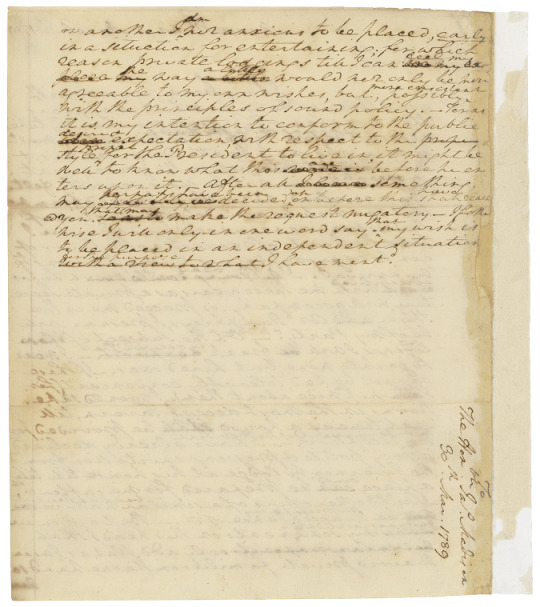
Letter from George Washington to Representative James Madison Regarding Plans for His Arrival in New York City for the Inauguration
Record Group 59: General Records of the Department of StateSeries: Letters ReceivedFile Unit: January THRU June 1789
Mount Vernon Mach 30th 1789 67
My dear Sir,
I have been favored with your letter of the 19th by which it appears that a quoram of Congress was hardly to be expected before the beginning of the [next?] week. As this delay must be very irksome to the attending members, & every days continuance of it (before the government is in [illegible] be more sensibly felt. I am resolved, none shall proceed from me that can not be avoided (after notice of the election is announced)and therefore I take the liberty of requesting the favor of you to engage a lodging for me previous to my arrival. Mr Lear who has already lived with me three years as a private secretary, will accompany, preceed me in the stage - and (7) Colo Humphreys, I presume, will be of my Party & Mr Lear. On the subject of those lodgings, I will be frankly declare to you that I mean to go into none, but hired ones. If these cannot be had, tolerably convenient (then I shall not be nice about them). I would take Rooms in the most decent Tavern, till such time as house <s>shall</s> can be provided for the reception more permanent of the President. I have already declined a very polite & pressing invitation from the Governor, to lodge at his house till a place <s>can</s> could be prepared for me; after which should any other offers of a similar nature be made & then could be no propensity in my acceptance of it. But as you <s>know</s> are fully acquainted with my sentiments on this lead, I shall only add that as I mean to avoid private families on the one hand so on another I am not anxious to be placed, <u>early</u> in a situation for entertaining; for which reason private lodgings till I can feel the way a little would not only be more agreeable to my own wishes, but, more consistent, possibly with the principles of sound policy. For as it is my intention to conform to the public desire & expectation, with respect to the <s>proper</s> style [illegible] for the President to live in, it might be then to know what those are before he enters upon it. After all something may perhaps have been decided upon before this shall have reached you that may make the request negatory. If otherwise I will only in one word say that my wish is to be placed in an independent situation <s>with a view to what</s> for the purpose I have next.
To
The Hon[ora]blee Jas. [James] Madison
30th Mar. 1789
58 notes
·
View notes
Text
Total Solar Eclipse Weather ☀
Most of us have heard this aphorism in some form: Climate is what you expect, weather is what you get.
Based on climatological records, long range predictions for conditions along the path of totality for the April 8th total solar eclipse had suggested that the Texas portion of the path would be relatively favorable while the New England portion would be unfavorable. But as it turns out, almost the opposite is true.
But as of Sunday, things don't look bright for most of the Texas portion of the path with the possible exception of the extreme northern end near Oklahoma. On the other hand, the portion of the path that goes through northern New England looks quite good for Monday afternoon.
Tomer Burg is a PhD candidate in meteorology at the University of Oklahoma. His 2021 hurricane season forecasts were superb. For example: he was way ahead of just about everybody in forecasting the effects of the remnants of Hurricane Ida on the Northeast.
So Tomer has added a section on eclipse visibility to his academic site. The page of most interest is the City Dashboard.
Go to the link below and click City Dashboard on the left.
2024 Eclipse Forecasts
At the dashboard you'll find a small map on the upper left showing the path of totality with circles indicating various locations of interest. Clicking a circle will cause maps to appear to the right which show both overall cloud cover and cloud layers broken down by cloud height.
Right now the Dallas forecast for eclipse time shows a predicted 59% overall cloud cover broken down as 24% low/28% mid/55% high cloud cover. On the other hand, Colebrook, New Hampshire's cloud forecast is: 0% overall, 0% low/0% mid/0% high cloud cover.
Cloud height is key. High clouds tend to be thin and wispy. They are less likely to interfere with eclipse viewing. Lower clouds tend to be more problematic – with the exception of the very small puffy "fair weather" clouds which tend to move quickly.
So don't be too put off by moderate percentages for high clouds as long as the percentages for lower clouds aren't very big.
Here's a non-interactive map created by Tomer. Consult the City Dashboard for more specific info.
This is predicted cloud cover. The darker the gray, the cloudier; the deeper the blue, the more cloudless.

^^^ In general: west-central and northeastern Arkansas could be the best places in the South to observe the eclipse. If you're looking for a spot in a blue state west of the Appalachians, Mount Vernon, Illinois is easy to get to with both I-57 and I-64 going through town. Cleveland and the area to its west look good. Indianapolis is also promising.
But the cloudless place to be in the US on Monday is northern New England; the Clinton County shore on the New York side of Lake Champlain may be the best place for NYC residents wanting to stay in state.
For up to date weather conditions, go to the official National Weather Service site. It's no nonsense – they aren't going to sensationalize anything nor try to sell you stuff. Just enter the location or ZIP in the upper left field.
National Weather Service
21 notes
·
View notes
Note
What's the itinerary? 👀
Hi, Anon! Happy to share.
My dream American Revolution trip itinerary, just including my must-sees, and a rough idea of transportation (still working on food stops and slipping in other points of interest):
Day 1:
Early morning flight to Boston, MA
Stay in Boston for 3 nights, 4 days
Rental car for Day 2 and 3
Boston Massacre Site
Boston Tea Party Ships & Museum
Bunker Hill Museum and Monument
Old North Church & Historic Site
Day 2:
Paul Revere House
Lexington Battle Green Tour, Lexington MA
Drive from Boston
Old North Bridge, Concord MA
Drive from Lexington
Day 3:
Adams National Historic Park, Quincy MA
Drive from Boston
General Nathaniel Greene Homestead, Coventry RI
Drive from Adams NHP
Day 4:
Early morning train/bus to Albany, NY
Stay in Albany 2 nights, 3 days
Rental car for Day 4 and 5
Saratoga National Historical Park, Stillwater NY
Drive from Albany
Fort Ticonderoga, Ticonderoga NY
Drive from Saratoga NHP
Day 5:
Schuyler Mansion tour
Washington’s Headquarters State Historic Site, Newbrugh NY
Drive from Albany
John Jay Homestead, Katonah NY
Drive from Washington Headquarters Newbrugh
Day 6:
Early morning train from Albany to New York City, NY
Stay in New York City for 4 nights, 5 days
Hamilton Grange National Memorial
Morris-Jumel Mansion
Day 7:
City Hall Park
Federal Hall
Fraunces Tavern Museum
Trinity Church & Cemetary
Day 8:
Museum of the City of New York
The Metropolitan Museum of Art
Day 9:
Van Cortlandt House Museum
Central Park
New York Historical Society Museum & Library
Weehawken Dueling Grounds/Hamilton Park, Weehawken, NJ
Take ferry to and from
Day 10:
Train/bus to Princeton, NJ
Stay in Princeton 2 nights, 3 days
Rental car for Day 11
Princeton Battlefield State Park
Day 11:
Monmouth Battlefield State Park, Manalapan, NJ
Drive from Princeton
Morristown National Historical Park, Morristown NJ (Includes: Ford Mansion/Washington’s Headquarters, Schuyler-Hamilton House, Jockey Hollow)
Drive from Monmouth Battlefield Park
Day 12:
Early train/bus to Trenton, NJ
Old Barracks Museum
Washington Crossing Park, Washington Crossing, PA
Train/bus from Trenton
Train/Bus from Washington Crossing to Philadelphia PA
Stay in Philadelphia 3 nights, 4 days
Rental car for Day 15 and 16
Day 13:
Independence Hall
Liberty Bell Center
First Bank of the United States
Carpenter’s Hall
Day 14:
Museum of the American Revolution
Elfreth’s Alley Museum
Day 15:
Valley Forge National Historical Park
Drive from Philadelphia
Moland House (Washington Headquarters), Warwick Township PA
Drive from Valley Forge NHP
Peter Wentz Farmstead (Washington Headquarters), Lansdale PA
Drive from Moland House
Day 16:
Cliveden of the National Trust (Chew House)
Drive from Philadelphia
Brandywine Battlefield (park), Chadds Ford PA
Drive from Cliveden
Afternoon or evening train from Philadelphia to Alexandria, VA
Stay in Alexandria for 2 nights, 3 days
Rental car for Day 18
Day 17:
George Washington’s Mount Vernon
Train/bus from Alexandria, VA
National Archives Museum, Washington DC
Train/bus from Alexandria, VA
Day 18:
James Madison’s Montpelier, Montpelier Station, VA
Drive from Alexandria, VA
Evening train from Alexandria to Williamsburg, VA
Stay in Williamsburg 2 nights
Day 19:
Colonial Williamsburg
Day 20:
Yorktown Battlefield
American Revolution Museum at Yorktown
Train/bus/taxi from Williamsburg
Day 21:
Fly from Williamsburg to Charleston, SC
Stay in Charleston for 4 nights, 5 days
Rental car for Days 22-24
South Carolina Historical Society Museum
Day 22:
Savannah History Museum, Savannah GA
Battlefield Park Heritage Center, Savannah GA
Drive from Charleston
Day 23:
Cowpens National Battlefield, Cowpens SC
Drive from Charleston
Eutaw Springs Battlefield Park, Eutawville SC
Drive from Cowpens
Day 24:
Magnolia Plantation and Gardens
Mempkin Abbey (site of Laurens family graves)
Day 25:
Fly home from Charleston SC
#my real challenge is finding someone to go with me#fun part about being visually impaired is you can’t legally drive#amrev#trips#road trip#the american revolution#american revolutionary war#new england#dream travel#traveling#18th century history
10 notes
·
View notes
Text
Alaska: Igloo, Kodiak bear, Iditarod sled dog race, Denali
Hawaii: pearl harbor, pineapple
washington: Space Needle, apple, mt st helens, rainier national park
oregon: roses, lighthouse, crater lake, oregon trail, hiking
california: redwood tree, white water rafting, gold, golden gate bridge, silicon valley, yosemite national park, wine country, sierra nevada mountains, hollywood, joshua tree
nevada: silver, las vegas strip, hoover dam
idaho: gemstones, potatoes
montana: rocky mountains, glacier national park, grizzly bear, bison
wyoming: yellowstone national park, old faithful geyser, bucking bronco
utah: great salt lake, zion national park, skiing
arizona: lake mead, grand canyon national park, montezuma castle, turquoise, saguaro cactus
new mexico: pueblo, yucca plant, carlsbad caverns
colorado: rocky mountain national park, columbine flower, elk
north dakota: oil, wind energy
south dakota: crazy horse memorial, the badlands, mount rushmore
nebraska: chimney rock, bald eagle, train
kansas: tornadoes, dodge city, sunflower
oklahoma: tomato, wheat, osage shield
texas: cattle, prickly pear cactus, oil refinery, the alamo, NASA Johnson space Center
Minnesota: lake of the woods, wolf, deer
iowa: prairie grass, corn
missouri; Hog, gateway arch
arkansas: razorback hog, banjo
louisiana: crayfish, mardi gras, jazz music
wisconsin: dairy
illinois: Willis tower, tractor, lincoln
michigan: copper, iron ore, automobile manufacturing, motown
indiana: Car
ohio: Rock and Roll Hall of Fame, tires
pennsylvania: street mill, liberty bell
new jersey: constitution
maryland: blue crab
virginia: mount vernon
north carolina: wright brothers national memorial, tobacco farm, great smoky mountains national park, appalachian mountains
south carolina: fort sumter
georgia: peanuts, peach
florida: oranges, kennedy space center, alligator, everglades national park
alabama: cotton, civil rights movement
mississippi: magnolia
tennessee: country music
kentucky: horse racing
west virginia: coal
new york: apple tree, financial market, statue of liberty
massachusetts: american revolution
vermont: maple syrup
new hampshire: fall colors
maine: acadia national park, moose, lobster
And don’t make me repeat it!!!!!!!
7 notes
·
View notes
Text
youtube
50 Years of Hip Hop (City Fest) | EP32
Shot & Edited by Me | IG: EYEOFTHELAMA
EOTLFILM$ ©️
#eyeofthelama#len lama#nyc#underground#rap#new ro#hip hop#3rd & 9th records#marvillous beats#trending#vlog#blog#mount vernon#city fest#50 years of hip hop#marridon#king combs#jim jones#dj webstar#capella grey#peter gunz#earn your leisure#p diddy#case#show#festival#culture#music#art#Youtube
0 notes
Video
Greek Dancers - Color by Kevin B. Moore Via Flickr: I also did a black and white version, which do you prefer?
#city#dance#event baltimore#greek#greek festival#mount vernon#people#zoom#photoshop#edited#motion#blur#movement#girls#flickr
0 notes